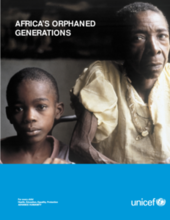This paper reports on the life circumstances of today’s orphaned children in Africa with new data and fresh analyses. The report presents a strategy for ensuring that all of Africa’s orphaned children have a safe, healthy and well-educated childhood, establishing the foundation for a productive adult life and for their countries’ overall development. Therefore, this paper encourages hope in the face of an epic disaster as it offers the possibility of change for those already orphaned and for the generation to come.
The document includes a description of the orphan crisis in Africa, complete with statistical data and figures, and analyses of some of the impacts orphaning has on children and families. The paper also presents a framework of action, highlighting the need for action on five fronts: (1) strengthening the capacity of families to protect and care for orphans and other children made vulnerable by HIV/AIDS, (2) mobilizing and strengthening community-based responses, (3) ensuring access to essential services for orphans and vulnerable children, (4) ensuring that governments protect the most vulnerable children, and (5) raising awareness to create a supportive environment for children affected by HIV/AIDS. According to the report, the orphan crisis in sub-Saharan Africa has implications for stability and human welfare that extend far beyond the region, affecting governments and people worldwide. Wealthy nations, therefore, must recognize that they have a vital role to play in accelerating the response to the orphan crisis. The paper suggests that these nations must mobilize substantially increased resources, keep this issue high on the global agenda, provide technical and material support, and ensure that progress towards global goals is monitored and that stakeholders are held accountable.

